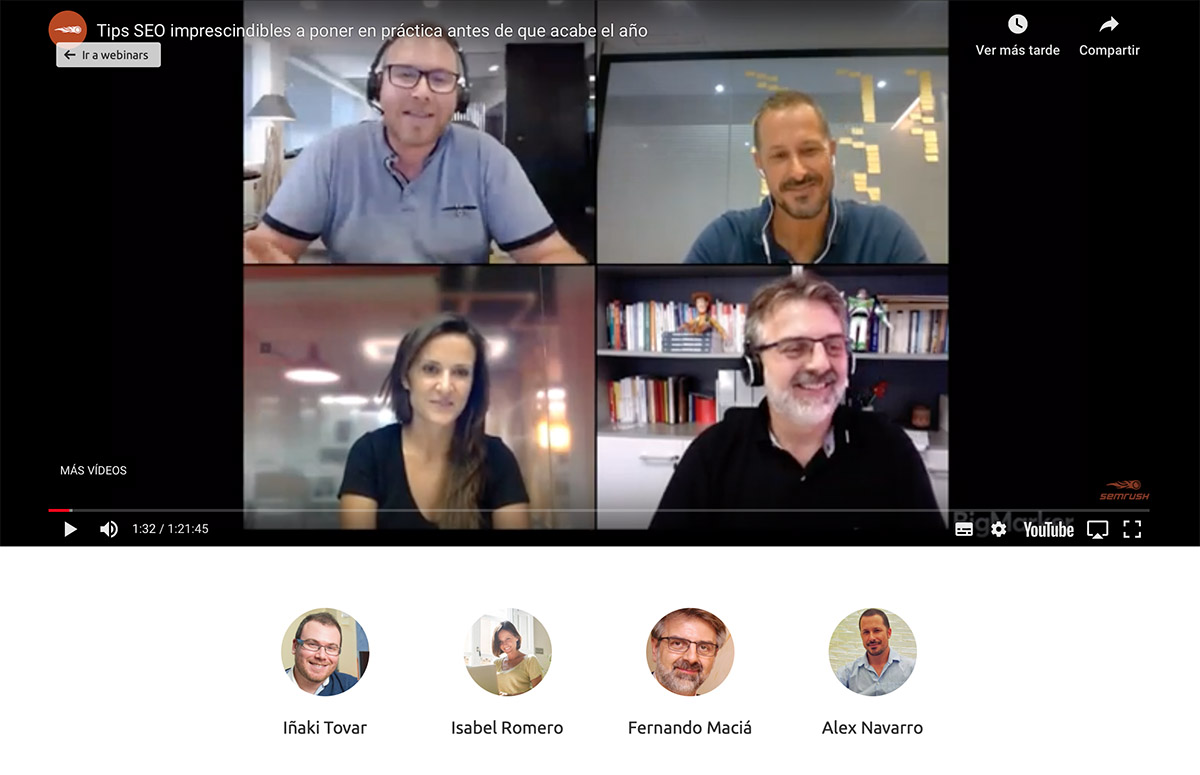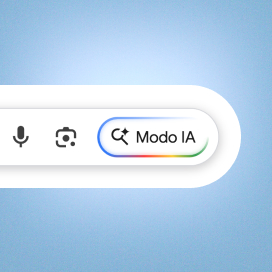Written by Aurora Maciá
Index

As soon as the webinar began, Isabel Romero introduced the main topics to be covered in the conversation:
- The importance of local SEO.
- The preponderance of mobile versions of websites with the deployment of the mobile-first index.
- How UX and CRO affects SEO.
- Voice searches and how to prepare for them.
- E-commerce vs. Amazon
These topics structured the discussion of the four experts as they also answered questions posed by viewers in the chat.
The importance of local SEO
Isabel Romero shared the fact that 99.8% of the total Spanish business fabric are SMEs. Google wants all these SMEs to invest in advertising and, therefore, creates tools to make it easy for them, such as Google My Business and even Google Maps, which seeks to become a social network after the demise of Google+. It is important to know in which area you want to stand out.
Alex Navarro pointed out how Google is increasingly showing more local results, being able to understand the user’s intention when they want to find nearby businesses and services. Therefore, websites must be optimized for local SEO. In addition, he pointed out the need to update the Google My Business listing for local businesses and provide it with as much content as possible, geolocate photos, etc.
Fernando Maciá added that many national businesses also want to have a local presence, so in addition to optimizing the Google My Business listing, a specific page is created for this purpose in the website architecture. However, he warned of the risk of focusing too much on local positioning if we want our business to be able to position itself nationally as well, because if Google perceives it as a local business, it may compete poorly outside.
In the case of a supermarket, for example, the difference between adding “online” or not in the search completely changes the results. When you search for “supermarket”, Google interprets it as a local search and will show the supermarkets near you, having to compete with the local division and not with the national website. However, if we add “online” the search intent is different and Google ignores all local aspects. Therefore, we must be very clear about what search we want to appear in, the business niche and the customer we are targeting, Fernando explained.
Isabel ended by pointing out that what works best at the local level for customer acquisition is Google Ads.
Impact of Mobile first
Isabel advised participants not to, as a general rule, let agencies present to them what a website looks like in desktop format. The first is the mobile version. We have to see if our website is mobile-friendly, he said. And if not, how to prepare it.
Later on, Fernando agreed with these words saying that, even if it is hard for us and we tend to imagine the design of a website in the desktop version, we must get used to design for mobile and take into account all its limitations (narrow screen, low download speed, etc.) to make it usable.
The real impact of mobile first has actually come in three areas:
- The location of the ads and to what extent they have stolen CTR from the organic results, even in position 0.
- If you work on informational searches and get a featured snippet (and if you do it right), you can have a CTR of up to 80%. Another thing is whether you can then monetize that traffic.
- Development with Javascript platforms. It’s not a very good idea to make your website depend on Javascript if it’s going to be very large and change content frequently, because you’re going to have a delay in indexing, it’s much less agile.
Fernando ended by warning about the danger of moving our websites to AMP versions, since it degrades the information architecture and does not preserve the interlinking, hierarchy, etc.
Despite the importance of the mobile version, the four experts acknowledged that they shop more often via PC than mobile, but they believe that the new generations will eventually get used to shopping with their smartphones. Alex pointed out that online stores have to be prepared for both scenarios, the experience has to be satisfactory in both versions. Fernando stated that we cannot go against the trend of mobile shopping, we must improve usability so that it becomes easier and easier to make purchases from mobile devices.
How UX and CRO affect SEO
In Search Console, Google offers tips to improve the user experience. Analytics also gives us a lot of data on UXIsabel pointed out the importance of the following: bounce rate, average duration of the visit…Isabel noted the importance of avoid pogosticking (entering a result and it does not present the answer you are looking for) since Google detects, by the user’s behavior, if the result is not being the best experience. Therefore, the title and metadescription must be taken care of.
Fernando recalled cases in which a page with Javascript content has fallen in the search results simply because of the user response when it failed and did not work properly, although nothing had changed in the rest of the on and off page factors.
Alex suspects that Google really does employ Analytics data, but it’s also possible that they pull all this user experience data from their browser, Google Chrome. As Iñaki says, “Chrome is your Analytics”.
Fernando points out that Google also seems to play a game of alternating who appears in the featured snippet for a while and decides who finally stays depending on user behavior.
Voice searches and how to prepare for them
“It changes a lot from how we search on the computer to how we talk,” said Isabel. He also felt that there was a need to evolve from keyword research tosearch intent research.
Fernando believes that there were disproportionate expectations regarding the use of voice searches, since in some places such as the United States it seems to be starting to take off, but in Spain it is still not widely used. The speed of adoption of this mode of interaction between man and machine will depend on whether you understand us if we speak naturally. Most voice assistants on the market right now don’t have displays, so there is no way to interact other than voice. It is necessary to wait until the market is mature, as happened with mobile, for the use of these terminals to really take off. However, we have to keep a watchful eye as its adoption can be really fast and we have to be prepared.
Alex points out that a good way to take voice searches into account is to insert the schema dedicated to frequently asked questions by introducing them informally, in a similar way to how we formulate them out loud.
Fernando also points out the speakable attribute so that attendees can read headlines and portions of media articles.
Isabel ends by highlighting the importance of chatbots: they increase the user’s permanence on the page.
E-commerce vs. Amazon
Do you have to pay the tribute of going through Amazon to appear on Google? This question, raised by Isabel, was answered by the consultants.
Alex acknowledged that, although he does not like Amazon, we have no choice, we have to adapt and if we want to sell we have to take into account that many people use Amazon to buy. You can compete against them but the best option is to sell in both to get as many sales as possible.
Fernando, for his part, believes it is convenient to start selling through Amazon when we are an unknown product, since we can take advantage of its reputation to generate trust in the user. In a second move, when we already have some brand recognition, we should try to bring some of that traffic to our website. Without Amazon, takeoff can be much slower.
Therefore, Amazon can be used to generate branding and people who have met us through it may end up looking for our website to buy directly from us.
Lastly, Iñaki introduced the topic of the implementation of the rel Sponsored and UGC attributes in Google published by the Google Webmaster blog.
Isabel believes it is a legal issue. Google, he believes, has had to deal with complaints and may be a response to this. Alex felt that Google wants us to do its job by pointing out what an ad is, given its inability to always detect it correctly. Fernando pointed out that when these indicators are present in the case of influencers on Instagram, for example, it is so that the user takes them into account in their own purchase decision algorithm and is clear that it is a sponsored opinion. Google wants these signals of when content is sponsored to be equally clear to its algorithm. It is also a clarification of the semantic relationship between two websites.



